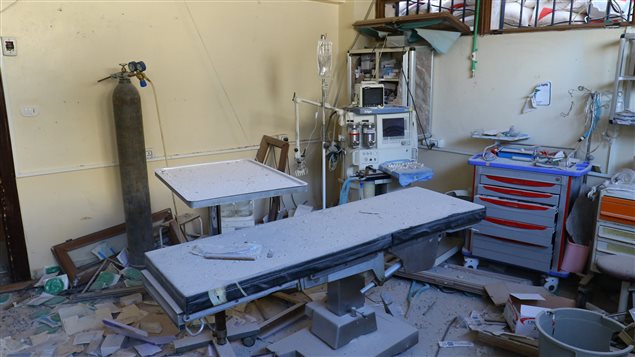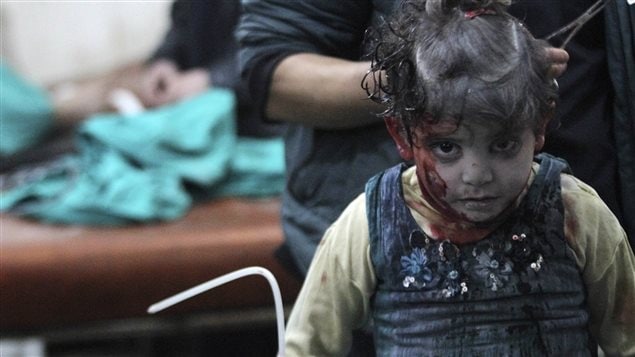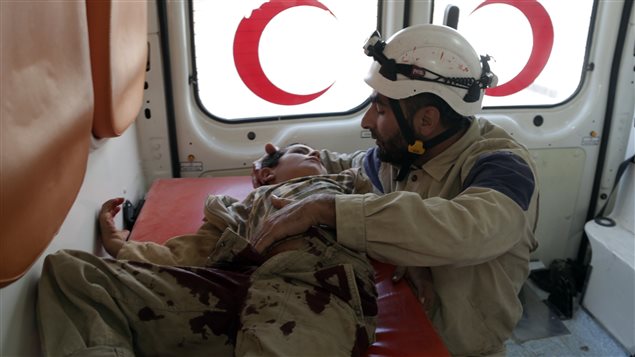Only one-third of Canadians are familiar with international humanitarian law and understand what it says about how wars must be waged, and nearly half say the Geneva Conventions make no real difference in preventing wars from getting worse, says a new survey released by the Red Cross.
The Canadian survey accompanies a global report released yesterday by the International Committee of the Red Cross (ICRC).
The 2016 People on War report is based on a survey of 17,000 people in 16 countries – ten countries affected by war and five countries, members of the UN Security Council, plus Switzerland – carried out by WIN/Gallup International.
‘Inevitable part of war’?

“We were surprised to see that 31 per cent of Canadians indicated that they believe that humanitarian aid workers being killed or injured as part of delivering aid in conflict zones was an inevitable part of war,” said Melinda Wells, director of Global Relations and Humanitarian Diplomacy for International Operations at the Canadian Red Cross.
(click to listen to the full interview with Melinda Wells)
ListenEight out of 10 Canadians think that it’s wrong to target hospitals, ambulances and health care workers in order to weaken the enemy, but 13 per cent say it’s just part of war, Wells said.
The survey also shows that 10 per cent of Canadians feel there are circumstances in which it is acceptable for combatants to target health care workers in a situation of armed conflict.
Of this group, over half indicated it is acceptable when health care workers are treating enemy combatants and 71 per cent indicated it’s acceptable if they are not clearly identified as health care workers.
“Everyone has the right to health care in armed, regardless of what side of the conflict they are on,” Wells said. “Attacks on medical personnel, facilities and vehicles are illegal under the rules of war.”
Knowing right from wrong

On the positive side, the majority of Canadians believe that combatants should avoid civilians as much as possible when attacking enemies in times of war, Wells said.
“It’s encouraging to see that the majority of Canadians believe there are limits to what can be done in war,” Wells said. “But we need to move that basic acceptance to really firmly advocating and speaking out for the importance of universal human rights in conflict zones, including the protection of humanitarian aid workers.”
Other key findings include:
- 21 per cent of Canadians surveyed did not feel that during conflict civilians should be avoided as much as possible during attacks on enemy combatants.
- Only 33 per cent of Canadians were familiar with International Humanitarian Law, with 43 per cent believing the Geneva Conventions make no real difference in preventing wars from getting worse.
- Internationally, a 36 per cent of respondents believe that captured enemy combatants can be tortured to obtain important military information. Only slightly less than half of the people (48 per cent) asked this year believe this behaviour is wrong, compared to 66 per cent in a 1999 survey.
- 78 per cent of people living in countries affected by war said it was wrong to attack enemy combatants in populated areas, knowing that many civilians would be killed. In the permanent member countries of the UN Security Council (China, France, Russia, the United Kingdom, and the United States), only 50 per cent of people said it’s wrong.
“Many of those that we surveyed, who said they had never heard of international humanitarian law, instinctively considered the violations to be wrong, which indicates that the rules are closely rooted to a common sense of humanity and the general feeling of what people have about what is and isn’t acceptable even in wartime,” Wells said.
Growing acceptance of torture?

While the Canadian survey did not ask questions about Canadians’ attitudes towards torture, the international survey clearly shows that over the past two decades there has been a real shift in public attitudes towards torture, Wells said.
“Internationally a startling 36 per cent of respondents are saying that captured enemy combatants can be tortured to obtain important military information,” Wells said.
Slightly less than half of the people (48 per cent) that were surveyed in this year’s survey believe that torture and all other forms of ill-treatment are prohibited, compared to 66 per cent of responders in the 1999 survey.
“This is really a worrying trend,” Wells said. “Torture and all other forms of ill-treatment are prohibited by international treaty and customary and they apply to every single state.”







For reasons beyond our control, and for an undetermined period of time, our comment section is now closed. However, our social networks remain open to your contributions.